Just like a fine wine requires patience to develop its complex character, you'll find life's most profound moments unfold gradually. You can't rush excellence – whether it's in relationships, personal growth, or achieving meaningful goals. Creating optimal conditions and paying attention to small details will enhance your experiences, while sharing these moments with others adds depth to your journey. When you slow down and savor each step, you'll discover subtle nuances that hurried living often misses. There's an art to experiencing life's richest moments, and the secrets lie in understanding the wisdom of the wine cellar.
Key Takeaways
- Like wine aging gracefully, personal growth requires patience and the right conditions to develop depth and character.
- Small, mindful actions and attention to detail create significant positive changes in both wine preservation and life experiences.
- Quality experiences should be savored slowly, focusing on depth and meaning rather than rushing through superficial moments.
- Building meaningful relationships mirrors wine sharing, creating lasting memories and fostering authentic connections through shared experiences.
- Creating optimal environments and removing negative influences helps nurture both wine and personal development toward their fullest potential.
The Virtue of Patience
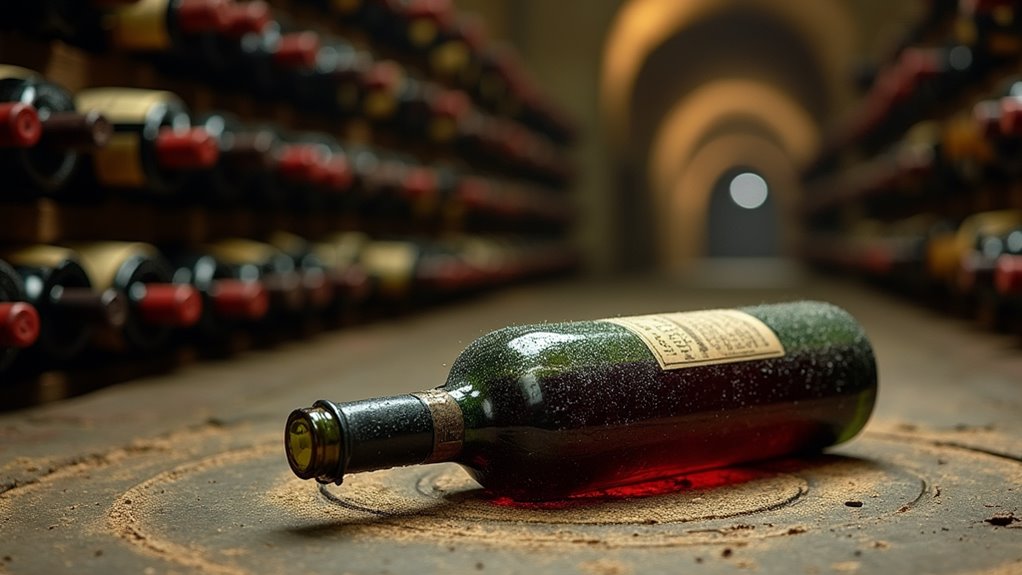
While many wine enthusiasts rush to uncork their newest bottles, seasoned collectors understand that patience yields the greatest rewards.
You'll discover that waiting allows wines to develop complex flavors, soften their tannins, and reach their full potential. Like life itself, wine teaches you that some of the best things can't be rushed.
When you're tempted to open that special bottle too soon, remember that time transforms ordinary wines into extraordinary experiences.
You'll learn to appreciate the waiting period as part of the journey, not just an obstacle to overcome. This principle extends beyond your cellar – whether you're building relationships, pursuing goals, or making important decisions, patience often determines the quality of the outcome.
Mindful Appreciation Through Time
When you allow a fine wine to rest and mature, you're practicing a mindfulness that extends beyond mere waiting.
You'll discover that patience transforms each tasting into a more meaningful ritual, as time unveils subtle complexities and deeper character.
Much like life's pivotal moments, wine teaches you to slow down and savor the unfolding experience with full presence and appreciation.
Patience Cultivates Rich Experiences
Just as wine requires years to develop its complex character, learning to cultivate patience in life yields profound rewards. When you rush through experiences, you'll miss the subtle nuances that make moments meaningful.
Like a fine wine that reveals different notes with each sip, life's richest experiences unfold gradually. You'll discover that waiting enhances appreciation, whether you're developing a new skill, building relationships, or pursuing goals.
By resisting the urge for instant gratification, you create space for depth and understanding to emerge. Think of patience as an investment in your future satisfaction – it's the deliberate choice to let experiences mature naturally.
The most memorable moments often come from situations where you've allowed time to work its transformative magic.
Living Each Sip Fully
The art of savoring wine teaches us to embrace each moment fully. When you raise a glass, you'll notice how the wine's color catches the light, how its aroma unfolds layer by layer, and how its flavors dance across your palate. Each sip becomes a meditation on presence and appreciation.
You can apply this mindful approach to daily life. Just as you wouldn't rush through a fine vintage, don't speed past meaningful experiences. Pay attention to the subtle details in conversations, the warmth of sunlight on your skin, or the sound of rainfall.
Notice how your perspective shifts when you slow down to appreciate life's nuances. Like a well-aged wine that reveals its complexity gradually, life's richest moments emerge when you give them time to develop.
Perfect Conditions Matter
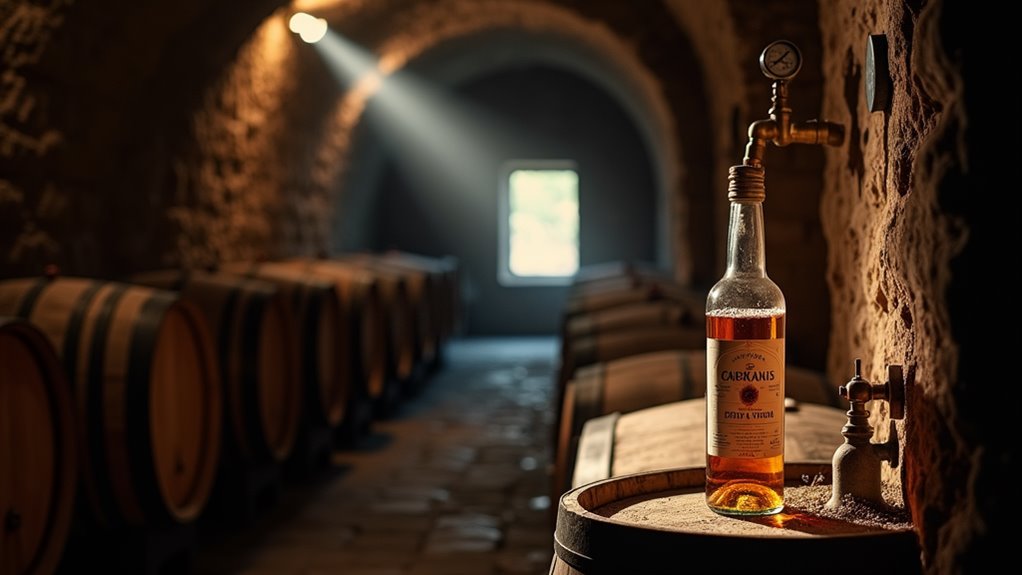
As any wine connoisseur knows, storing wine requires careful attention to environmental conditions. Your cellar needs precise temperature control, optimal humidity levels, and protection from harmful UV rays.
Just like wine, you'll thrive when you create the right environment for yourself. You can't expect peak performance in chaos or growth in toxic conditions.
Whether it's your workspace, relationships, or living situation, the environment you cultivate directly impacts your wellbeing. Take control of what you can: minimize stress, surround yourself with supportive people, and create spaces that inspire you.
Remember that fine wine develops its complex character under specific conditions over time. Similarly, you'll develop your best qualities when you intentionally craft an environment that nurtures your growth and potential.
Small Details Make Big Differences
While optimal storage conditions lay the foundation for aging wine, microscopic elements can dramatically alter its final character.
You'll notice how even minor variations in temperature, light exposure, or cork quality can transform a wine's taste and aroma over time. A fluctuation of just a few degrees or brief exposure to UV rays may accelerate aging or diminish the wine's intended profile.
The same attention to detail extends to handling.
You shouldn't overlook the impact of bottle orientation, as even slight tilting can affect how the wine interacts with its cork. The depth of cork insertion, cleanliness of the bottle neck, and integrity of the capsule seal all play crucial roles in preservation.
Embrace Natural Transformation
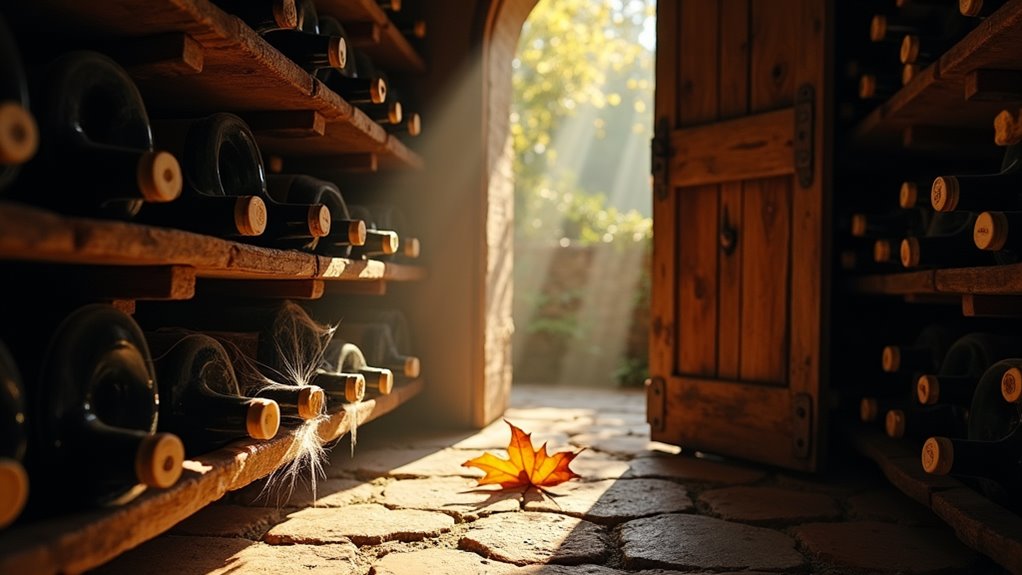
Much like humans evolve with time, wine undergoes a fascinating journey of transformation in the cellar.
You'll discover that each bottle develops its own character, influenced by temperature, humidity, and the subtle dance of chemical reactions within. As your wine ages, it'll soften its sharp edges, deepen its complexity, and reveal layers of flavor you couldn't have imagined on day one.
Don't resist these changes – they're part of wine's natural metamorphosis. You might notice that a bold Cabernet becomes more nuanced, or a crisp Chardonnay develops buttery notes.
Just as you've grown wiser through life experiences, wine gains wisdom in the darkness of the cellar. Learn to appreciate both the vibrant energy of young wines and the contemplative depth of mature vintages.
Building Meaningful Connections
When you gather friends around a bottle of wine, you're creating more than just a casual drinking session – you're crafting memories that'll last a lifetime.
Wine serves as a natural catalyst for conversation, breaking down social barriers and encouraging authentic connection.
Just as wine evolves through careful aging and interaction with its environment, your relationships deepen through shared experiences and meaningful dialogue.
You'll find that discussing a wine's subtle notes often leads to deeper conversations about life, dreams, and cherished moments.
Each bottle becomes a chapter in your shared story, marking celebrations, milestones, or simple evenings of heartfelt connection.
Take time to nurture these bonds, just as you'd carefully store and age a precious vintage.
The best wines, like the strongest friendships, improve with time and attention.
Quality Over Quantity
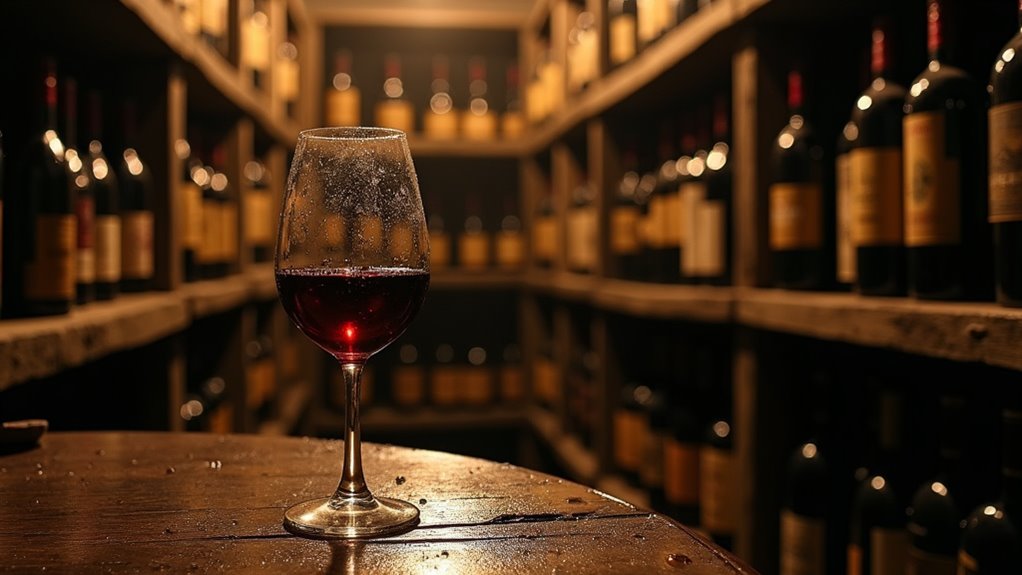
When you're building your wine collection, it's better to select fewer premium bottles than to fill your cellar with mediocre wines.
You'll find more joy in savoring each carefully chosen glass than rushing through multiple bottles of lesser quality.
Choose Select Premium Bottles
Although novice wine collectors often feel tempted to fill their cellars quickly, building a premium collection isn't about quantity.
You'll find more joy in selecting a few exceptional bottles that reflect your personal taste and appreciation for craftsmanship.
Start by researching prestigious wine regions and renowned vintners. You don't need to spend a fortune, but invest in bottles from reputable producers who maintain high standards.
Focus on wines that have received positive reviews from trusted critics and have good aging potential. Consider factors like vintage years, storage conditions, and the wine's peak drinking window.
Remember that each premium bottle you select should tell a story or mark a special occasion.
When you choose quality wines thoughtfully, you'll create a collection that brings genuine pleasure and becomes more valuable over time.
Savor Every Single Glass
Anyone can drink wine quickly, but true connoisseurs understand the art of savoring each sip. When you're mindful of every glass, you'll discover subtle flavors, aromas, and textures that rushed drinking simply can't reveal.
Take time to observe the wine's color and clarity as you tilt your glass, then gently swirl to release its bouquet.
Let the wine's aroma tell its story before you taste.
As you sip, notice how the flavors evolve on your palate – from the initial impression to the lingering finish.
Don't feel pressured to finish quickly; instead, allow each glass to be an experience.
You'll find that when you slow down and appreciate the complexity of what's in your glass, you'll naturally drink less while enjoying more.
Less Means More Appreciation
Excellence in wine appreciation isn't about the quantity you consume but the quality you choose. When you limit yourself to fewer glasses, you'll discover that each sip becomes more meaningful and memorable. You'll pay closer attention to the wine's subtle notes, its texture, and how it evolves in your glass.
Think of it like savoring a sunset – you don't need to watch ten sunsets in a row to appreciate their beauty. One thoughtfully observed moment can leave a lasting impression.
By choosing quality over quantity, you'll develop a more sophisticated palate and a deeper understanding of what makes each wine special.
You'll also find that meaningful experiences often come from taking your time with just one exceptional glass rather than rushing through many mediocre ones.
Frequently Asked Questions
How Do You Properly Store Wine if You Don't Have a Cellar?
You can store wine effectively without a cellar by keeping bottles in a wine fridge or cool, dark closet.
Maintain temperatures between 45-65°F, with 55°F being ideal. Lay bottles horizontally to keep corks moist, and avoid areas with temperature fluctuations or vibrations.
If you don't have a wine fridge, use your regular refrigerator's bottom shelf for short-term storage.
What Are the Best Entry-Level Wines for Beginning Collectors?
Start your collection with reliable, well-priced wines that age gracefully.
You'll want to focus on Cabernet Sauvignon from California's Napa Valley, Bordeaux from France, or Rioja from Spain.
Look for bottles in the $30-75 range from established producers like Beringer, Chateau Lynch-Bages, or Muga.
Don't forget to include some versatile whites like German Riesling or white Burgundy.
Can Wine Really Go Bad if Stored Incorrectly?
Yes, your wine can definitely spoil if you don't store it properly.
Heat, light, and improper humidity will wreck even the finest bottles. If you store wine above 70°F, it'll age too quickly and taste flat or cooked.
Direct sunlight breaks down the compounds that give wine its flavor, while dry conditions can shrink corks, letting air spoil the wine.
You'll know it's bad if it smells like vinegar or wet cardboard.
How Much Should I Expect to Spend on a Quality Wine Collection?
Like Rome, you can't build a quality wine collection in a day.
Plan to invest anywhere from $500 to start a modest collection to $5,000+ for a more serious undertaking. You'll want to allocate funds for proper storage solutions ($200-1,000) and focus on acquiring 2-3 bottles each month.
Don't feel pressured to buy expensive wines immediately – start with quality bottles in the $20-50 range.
What's the Average Time to Properly Age Different Types of Wine?
Aging time varies significantly by wine type.
You'll find most white wines are ready to drink within 1-3 years, while light reds like Pinot Noir peak at 2-5 years.
Full-bodied reds such as Cabernet Sauvignon and Syrah typically need 5-10 years to reach their potential.
Premium Bordeaux and Barolo can improve for 15-20 years.
Conclusion
Just like that 1982 Bordeaux that needs decades to reveal its true character, you'll find life's most precious moments unfold in their own time. Whether you're aging wine or growing through experiences, remember that rushing only diminishes the potential. Take a cue from those patient collectors who understand that today's simple grape juice could become tomorrow's masterpiece – if you just give it time and the right conditions.
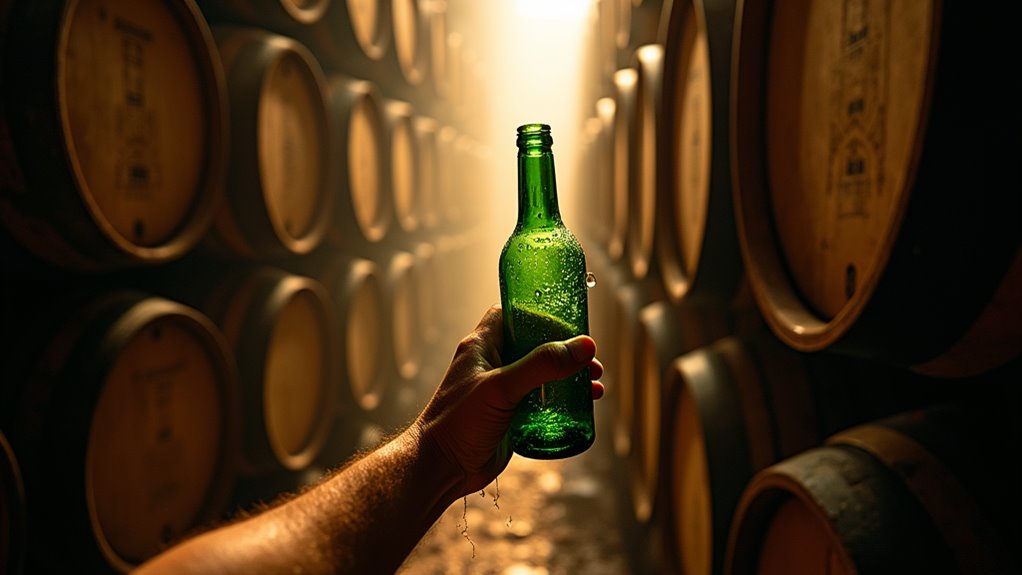
Leave a Reply